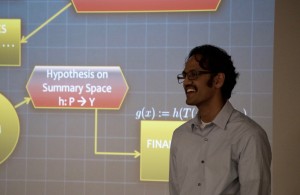Research Triangle Analysts met at RENCI for their first monthly meeting of the new year on January 19. Research Triangle Analysts meet at RENCI every third month and elsewhere around the Triangle during other months. The group, a 501(c)(3) non-profit and all-volunteer organization, promotes the advancement of data science throughout the Triangle’s collaborative communities of analysts, mathematicians, statisticians, and scientists.
Hamza Ghadyali, a PhD candidate in mathematics at Duke University, featured as the speaker for the meeting. Ghadyali develops new topological data analysts (TDA) tools, particularly for the analysis of electroencephalogram (EEG) data. Topology is the mathematical study of shape. TDA tools analyze large, noisy, complex datasets from disciplines such as, but not limited to, oncology, astronomy, meteorology, and neuroscience. Analysis of the shapes and changes in shape represented by data yield information about the data.
Ghadyali outlined the topological methods of homology which describes shapes by their holes. By representing data as graphs, networks of nodes connected by edges, the homology of data emerges. Ghadyali described building a higher-dimensional generalization of a graph known as a simplicial complex. By building a family of simplicial complexes called a filtration, the data can be examined at multiple scales. Tracking how the homology of the simplicial complexes changes across multiple scales, that is, quantifying how holes persist over multiple scales, identifies a phenomenon known as persistent homology. Ghadyali also detailed one method of constructing a filtration, known as a Morse filtration, as a particular way of building the family of simplicial complexes from a function or a signal such as an EEG time series.

Hamza Ghadyali presents topological data analysis to the Research Triangle Analysts meeting at RENCI.
EEGs are signals obtained from electrodes placed on the brain measuring electrical activity. Epilepsy is characterized by abnormal electrical activity. Ghadyali’s research creates and adapts TDA methods to understand EEGs of epileptic patients. His work characterizes epileptic abnormalities using topological signatures and also uses machine learning to build seizure detection and localization algorithms. Machine learning in the form of supervised learning plays a role in the discovery of the seizure detection algorithms by automatically identifying which topological features are most relevant to characterizing seizures.
View video of Ghadyali’s talk here as well as the illustrations in his presentation here.
-Chris Calloway



